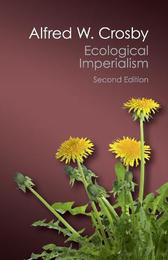
|
Ecological Imperialism: The Biological Expansion of Europe, 900-1900
Paperback / softback
Main Details
| Title |
Ecological Imperialism: The Biological Expansion of Europe, 900-1900
|
| Authors and Contributors |
By (author) Alfred W. Crosby
|
| Series | Canto Classics |
|---|
| Physical Properties |
| Format:Paperback / softback | | Pages:388 | | Dimensions(mm): Height 216,Width 138 |
|
| Category/Genre | World history
Colonialism and imperialism
Ecological science
Applied ecology |
|---|
| ISBN/Barcode |
9781107569874
|
| Classifications | Dewey:304.2094 |
|---|
| Audience | |
|---|
| Edition |
2nd Revised edition
|
| Illustrations |
20 Plates, black and white; 7 Halftones, black and white
|
|
Publishing Details |
| Publisher |
Cambridge University Press
|
| Imprint |
Cambridge University Press
|
| Publication Date |
6 October 2015 |
| Publication Country |
United Kingdom
|
Description
People of European descent form the bulk of the population in most of the temperate zones of the world - North America, Australia and New Zealand. The military successes of European imperialism are easy to explain; in many cases they were a matter of firearms against spears. But as Alfred W. Crosby maintains in this highly original and fascinating book, the Europeans' displacement and replacement of the native peoples in the temperate zones was more a matter of biology than of military conquest. European organisms had certain decisive advantages over their New World and Australian counterparts. The spread of European disease, flora and fauna went hand in hand with the growth of populations. Consequently, these imperialists became proprietors of the most important agricultural lands in the world. In the second edition, Crosby revisits his now classic work and again evaluates the global historical importance of European ecological expansion.
ReviewsReview of previous edition: 'Crosby has unfolded with great power the wider biopolitics of our civilization.' Nature Review of previous edition: '[This] book is important, and required reading for politicians worldwide ... Nuclear war may be spectacular and a valid focus for our exertions, but ecological insouciance is even more dangerous because it is unspectacular, and it merits efforts to combat it as strenuous and urgent.' The Guardian Review of previous edition: 'The biological bases of radically changing historical ecosystems must never be forgotten - and Crosby has made them intelligible as well as memorable.' Natural History Review of previous edition: 'Crosby argues his case with vigour, authority and panache, summoning up examples and illustrations that are often as startling in their character as in their implications. Ecological Imperialism could not ask for a more lucid and stylish exponent.' The Times Literary Supplement Review of previous edition: 'In telling his very readable story, Mr Crosby combines a historian's taste for colorful detail with a scientist's hunger for unifying and testable generalization ... [He] shows that there is more to history than kings and battles, and more to ecology than fruits and nuts.' The Wall Street Journal
|